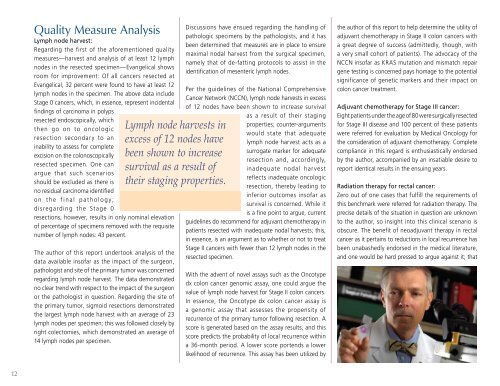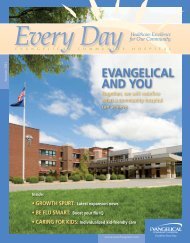Cancer program annual report 2010 - Evangelical Community Hospital
Cancer program annual report 2010 - Evangelical Community Hospital
Cancer program annual report 2010 - Evangelical Community Hospital
You also want an ePaper? Increase the reach of your titles
YUMPU automatically turns print PDFs into web optimized ePapers that Google loves.
Quality Measure Analysis<br />
Lymph node harvest:<br />
Regarding the first of the aforementioned quality<br />
measures—harvest and analysis of at least 12 lymph<br />
nodes in the resected specimen—<strong>Evangelical</strong> shows<br />
room for improvement: Of all cancers resected at<br />
<strong>Evangelical</strong>, 32 percent were found to have at least 12<br />
lymph nodes in the specimen. The above data include<br />
Stage 0 cancers, which, in essence, represent incidental<br />
findings of carcinoma in polyps<br />
resected endoscopically, which<br />
then go on to oncologic<br />
resection secondary to an<br />
inability to assess for complete<br />
excision on the colonoscopically<br />
resected specimen. One can<br />
argue that such scenarios<br />
should be excluded as there is<br />
no residual carcinoma identified<br />
on the final pathology;<br />
disregarding the Stage 0<br />
resections, however, results in only nominal elevation<br />
of percentage of specimens removed with the requisite<br />
number of lymph nodes: 43 percent.<br />
Lymph node harvests in<br />
excess of 12 nodes have<br />
been shown to increase<br />
survival as a result of<br />
their staging properties.<br />
The author of this <strong>report</strong> undertook analysis of the<br />
data available insofar as the impact of the surgeon,<br />
pathologist and site of the primary tumor was concerned<br />
regarding lymph node harvest. The data demonstrated<br />
no clear trend with respect to the impact of the surgeon<br />
or the pathologist in question. Regarding the site of<br />
the primary tumor, sigmoid resections demonstrated<br />
the largest lymph node harvest with an average of 23<br />
lymph nodes per specimen; this was followed closely by<br />
right colectomies, which demonstrated an average of<br />
14 lymph nodes per specimen.<br />
Discussions have ensued regarding the handling of<br />
pathologic specimens by the pathologists, and it has<br />
been determined that measures are in place to ensure<br />
maximal nodal harvest from the surgical specimen,<br />
namely that of de-fatting protocols to assist in the<br />
identification of mesenteric lymph nodes.<br />
Per the guidelines of the National Comprehensive<br />
<strong>Cancer</strong> Network (NCCN), lymph node harvests in excess<br />
of 12 nodes have been shown to increase survival<br />
as a result of their staging<br />
properties; counter-arguments<br />
would state that adequate<br />
lymph node harvest acts as a<br />
surrogate marker for adequate<br />
resection and, accordingly,<br />
inadequate nodal harvest<br />
reflects inadequate oncologic<br />
resection, thereby leading to<br />
inferior outcomes insofar as<br />
survival is concerned. While it<br />
is a fine point to argue, current<br />
guidelines do recommend for adjuvant chemotherapy in<br />
patients resected with inadequate nodal harvests; this,<br />
in essence, is an argument as to whether or not to treat<br />
Stage II cancers with fewer than 12 lymph nodes in the<br />
resected specimen.<br />
With the advent of novel assays such as the Oncotype<br />
dx colon cancer genomic assay, one could argue the<br />
value of lymph node harvest for Stage II colon cancers.<br />
In essence, the Oncotype dx colon cancer assay is<br />
a genomic assay that assesses the propensity of<br />
recurrence of the primary tumor following resection. A<br />
score is generated based on the assay results, and this<br />
score predicts the probability of local recurrence within<br />
a 36-month period. A lower score portends a lower<br />
likelihood of recurrence. This assay has been utilized by<br />
the author of this <strong>report</strong> to help determine the utility of<br />
adjuvant chemotherapy in Stage II colon cancers with<br />
a great degree of success (admittedly, though, with<br />
a very small cohort of patients). The advocacy of the<br />
NCCN insofar as KRAS mutation and mismatch repair<br />
gene testing is concerned pays homage to the potential<br />
significance of genetic markers and their impact on<br />
colon cancer treatment.<br />
Adjuvant chemotherapy for Stage III cancer:<br />
Eight patients under the age of 80 were surgically resected<br />
for Stage III disease and 100 percent of these patients<br />
were referred for evaluation by Medical Oncology for<br />
the consideration of adjuvant chemotherapy. Complete<br />
compliance in this regard is enthusiastically endorsed<br />
by the author, accompanied by an insatiable desire to<br />
<strong>report</strong> identical results in the ensuing years.<br />
Radiation therapy for rectal cancer:<br />
Zero out of one cases that fulfill the requirements of<br />
this benchmark were referred for radiation therapy. The<br />
precise details of the situation in question are unknown<br />
to the author, so insight into this clinical scenario is<br />
obscure. The benefit of neoadjuvant therapy in rectal<br />
cancer as it pertains to reductions in local recurrence has<br />
been unabashedly endorsed in the medical literature,<br />
and one would be hard pressed to argue against it; that<br />
12












